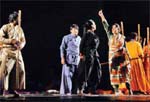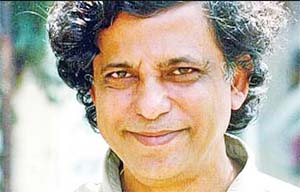The post Posthumous Swadhinata Padak awarded to Selim Al Deen appeared first on Dhaka Mirror.
]]>The Swadhinata Padak, Bangladesh’s highest civilian award, the Cabinet Division announced awardees for this year yesterday.
Nine individuals and one institution have been chosen for this year’s Swadhinata Padak, across several categories. Playwright Dr Mohammad Mainuddin Ahmed (Selim Al Deen) has been nominated posthumously for the award under the “Literature” category, for his contributions to the country in that sector.
The late thespian’s contributions to Bangladeshi theatre are unparalleled. The playwright ignited the renaissance of modern theatre by treasuring the essence of the rural culture in the country.
His most significant plays include, “Jaundice and various balloons” (1975), “Muntaser Fantashi” (1976), “Shakuntala” (1977), “Bashon” (1985), “Keramatmangal” (1985), “Hat Hadai” (1988), and “Hargoj” (1993), among others.He has also written the popular television projects “Nishwora Bhalobasha”, “Bhangoner Shobdo Shuni” and “Chhaya Shikari”, among others.
Alongside plays, Selim Al Deen also authored two poetry collections, “Kobi O Timir” (1990) and “Swapna Ramanigan” (2007), alongside his only novel “Amrita Upkshan”. His plays “Kitton Khola” (1978–80) and “Chaka” (1991) were adapted into films that earned praise at home and abroad. He also wrote the dialogues for the well-acclaimed film, “Ekattorer Jishu” (1993).
He was also the recipient of the Bangla Academy award, Kathak Sahitya Puroshkar, Nandikaar Puroshkar, Best Tele-Playwright Award, National Cinema Award, Khaleqdad Chowdhury Sahitya Puroshkar (2001), Alokta Sahitya Puroshkar (2007) and the Munier Chowdhury Sammanona.
Selim Al Deen was laid to rest near the central mosque of Jahangirnagar University, where he had taught for 30 years and founded the Dramatics Department.
The post Posthumous Swadhinata Padak awarded to Selim Al Deen appeared first on Dhaka Mirror.
]]>The post Selim Al Deen’s three plays staged appeared first on Dhaka Mirror.
]]> On the closing day of the Selim Al Deen Janmautsab 2011, a two-day theatre festival to celebrate the 62nd birth anniversary of theatre icon Selim Al Deen, three plays were staged at three auditoriums of Bangladesh Shilpakala Academy (BSA) on 19 August.
On the closing day of the Selim Al Deen Janmautsab 2011, a two-day theatre festival to celebrate the 62nd birth anniversary of theatre icon Selim Al Deen, three plays were staged at three auditoriums of Bangladesh Shilpakala Academy (BSA) on 19 August.Dhaka Theatre brought its production Dhaboman on the stage of National Theatre Hall of BSA.
Natyacharya Selim Al Deen’s Dhaboman belongs to the post-colonial narrative theatre form. The play has been directed by Shimul Yousuff.
The play focuses on our indigenous traditions, folktales and art forms through using pieces of metaphors.
Set in a village by the river Someshwari in the greater Mymensingh area, the plot of the play revolves around a buffalo named Sohrab as its protagonist.
One day coincidently, a domestic buffalo, Hamela gets lost in the evening and returns home after being pregnant.
The Garo communities become happy and think of the incident as omen of good luck. When the time arrives, a black buffalo is born and it has been named Sohrab.
As the story progresses, Sohrab becomes a famous a warrior buffalo. But, one day, the owner of Sohrab dreams if it is sacrificed and slaughtered, he will be cured of his disabilities.
Sensing the danger, Sohrab flees from the master’s house.
Theatre troupe Swapnadal staged Hargoj at the auditorium of Experimental Theatre Hall of BSA as part of the festival.
It was directed by Zahid Repon. Selim Al Deen’s narrative Hargoj is based on a true story. Following a tornado, the play depicts the sufferings of the masses in a village named Hargoj under Manikganj district. The tornado hit the village in 1989.
Selim Al Deen wrote the play three years after the tornado hit the village. Through Hargoj, the master playwright not only depicted the massacre twisted by the tornado but also raised the question of rescues in terms of humanity.
The play centres on an aid-team that arrives at the tornado-hit village. The tornado shatters the bustling locale of farmers, killing hundreds of people and damaging a large part of the area.
Abid, the protagonist of the play, gets strange experiences in his aid-tour. The playwright sees, experiences and narrates different aspects of life through the eyes of Abid during this time of a disaster.
Theatre troupe DyashBangla staged Selim Al Deen’s Julan on the stage of Studio Theatre Hall of BSA.
Directed by Prabir Guha, the play is a statement of the Uruk community. After facing a severe drought, the community decides to migrate to the other side of Elan Mountains and the plain land is called Julan. It is a hard decision for the people to leave their village where they have been living for hundreds of years.
Revolving around a love story between Eshtar and Gamesh, the play focuses on the conflict between greed and power in a community.
-With Daily Sun input
The post Selim Al Deen’s three plays staged appeared first on Dhaka Mirror.
]]>The post Remembering an icon appeared first on Dhaka Mirror.
]]>The inaugural programme was held at the lobby of National Theatre Hall, BSA. ITI Worldwide President Ramendu Majumdar inaugurated the festival as chief guest. Speaking on Al Deen, Majumdar called him “one of the virtuoso creative titans who elevated Bengali theatre.”
Dhaka Theatre chief Nasiruddin Yousuff expressed that he and his troupe along with all the theatre activists of Bangladesh want to celebrate Al Deen and his works, not only on particular occasions but throughout the year.
Among others, Sara Ara Mahmud, director, Department of Film and Theatre, BSA spoke at the inaugural programme.
Artistes of the theatre troupe Swapnadal presented a brief choreography accompanied with music. The performance featured songs eulogising Al Deen.
At the three theatre venues of BSA, Dhaka Theatre, Swapnadal and Shilpakala Academy staged plays written by Al Deen.
Dhaka Theatre staged its much-acclaimed production “Nimojjon” at the National Theatre Hall. Directed by Nasiruddin Yousuff, the play addresses the horrors of genocides throughout the ages across the globe.
“Nimojjon” does not have a particular storyline. According to the play, the history of civilisation and genocides are interwoven — every civilisation has had a history of genocide. And the repetition of these brutal incidents has brought down humans from the superior position.
The cast included Milu Chowdhury, Asaduzzaman Aman, Sirajul Islam, Samiun Jahan and Sayeed Rinku.
Swapnadal staged “Festoon-e Lekha Smriti” at the Experimental Theatre Hall. The play depicts Al Deen’s Liberation War memories, and is an adaptation of an article published in the Bangla daily Ajker Kagoj in 1993. Zahid Ripon has directed the play.
Shonali, Sharif, Emon, Shishir, Laboni and Anu were among the actors in the play.
Shilpakala Academy staged “Putro” at the Studio Theatre Hall. Directed by Mohammad Jasimuddin, the play follows a couple who lose their only child.
Enamtara Saki and Bakar Bakul played the duo.
The exhibition at the lobby of National Theatre Hall included posters and photographs. The display also featured miniature replicas of the stages used in Al Deen plays such as “Chaka”, “Prachya”, “Hargoj”, “Dhaboman” and “Bano Pangshul”.
-With The Daily Star input
The post Remembering an icon appeared first on Dhaka Mirror.
]]>